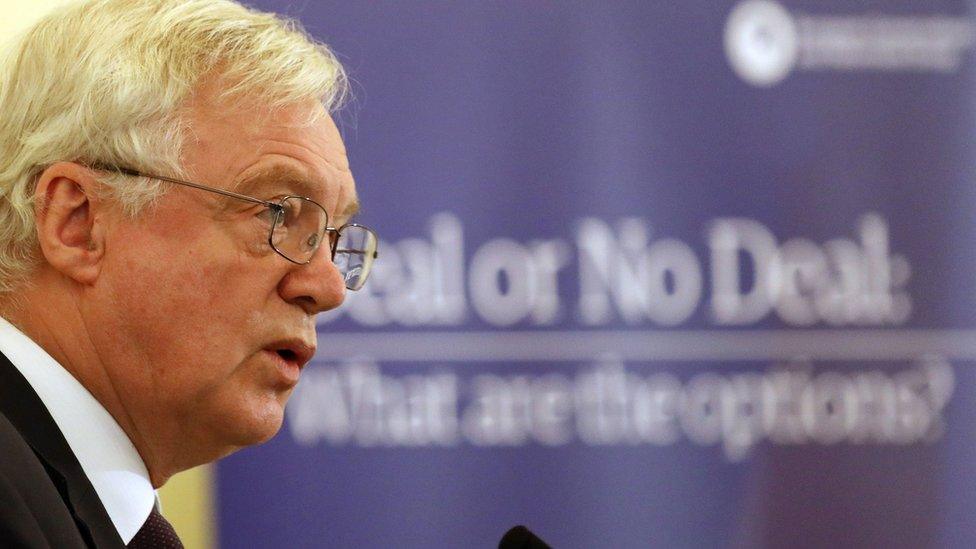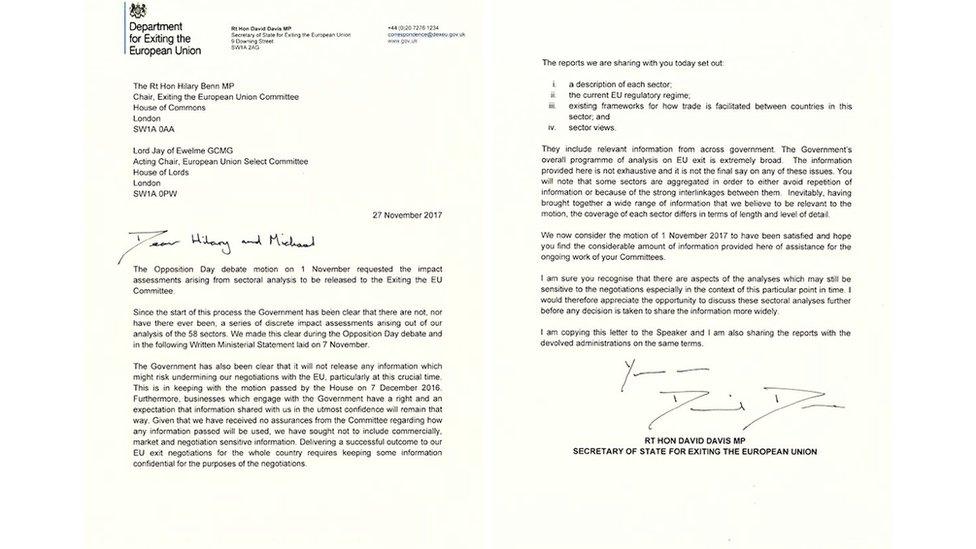Brexit impact reports: 'Row of their own making'
- Published

A letter from David Davis to the Brexit Committee has upset some members
The Department for Exiting the European Union has found itself in a pickle thanks to a stash of documents that government sources claim don't really exist.
The opposition parties are indignant that they have not been given the full version of the documents that the government claims didn't exist in the first place.
And they are intent on pushing them back to parliament to force them to give more information about the things that don't exist, or do exist...
This is because tonight, the one thing that we can be sure of is that there is a cache of hundreds of pages of documents sitting in a safe somewhere in Westminster.
Lots of MPs are cross and the government, which already has its plate more than full, has just failed to close down a brouhaha that has already been going on for months.
So what on earth is actually going on? With a little bit of artistic licence, this is roughly and broadly what has happened - although given the above cocktail of Kafka and The Thick of It, do forgive me if it is hard to source a completely straight or official account that all sides agree on.
Having been caught by surprise by the referendum, Whitehall found itself with no plans for how to manage the exit from the EU.
By political instruction, there had been no preparation for that outcome - nada, zip, nothing - for potentially the biggest change to the country in decades.
Scrabbling to, quite understandably, look like they knew what they were doing, with a completely changed government (including two new government departments), the most important new kid on the block - the Department for Exiting the European Union - moved to assure people.
They wanted them to know that they were planning on a well thought through basis, taking the proper soundings and taking an organised and analytical approach to the process.
Official sources close to David Davis at the time said that they were conducting analyses of more than 50 sectors of the economy or "don't worry, we're doing all the proper research you'd imagine."
The Brexit Secretary himself said as much to a committee of MPs in December last year, saying: "We've carried out or are in the midst of carrying out about 57, I think, sectoral analyses, each of which has implications for individual parts of 85% of the economy, and some of those are still to be concluded.
"We have work still to be done on justice and home affairs, so there is a fair number of things still to do. So it will be as soon as we're ready."

Hilary Benn, the head of the Brexit Committee, has been waiting for the reports
It was no surprise, given this is the most contentious issue of our times, that MPs started to ask again and again for those studies to be published.
Where were they? What were they? Were they 'secret reports'?
The government played for time to complete this extremely serious and detailed work - just wait, it will all become clear.
Eventually, however (and this is the short version - you'll thank me, honest), MPs, the Labour front bench and the influential Brexit Committee, chaired by former Labour minister, Hilary Benn, had had enough.
MPs, including Tories, Brexiteers and Remainers, joined in the calls for the reports to be published and eventually last month they forced a vote in the Commons that defeated the government.
Parliament gave that day its instruction to them to stop pussyfooting around and publish the mysterious studies.
There were whispers too that the government whips had been told by DEXEU that the vote wasn't that big a deal and had told MPs that they could go home before the vote. But that's another miscalculation, and another story.
Any heavy lifting?
Only after that vote did chatter really emerge that the problem was not necessarily that the government was trying to cover up the assessments because they were the stuff of nightmares - although I'm told the original versions, in parts, contained plenty of horror stories.
Instead, part of the issue was, in the words of one official, that the work was "embarrassingly thin".
Cue panic, it's suggested in Whitehall to cobble together in some areas reports that look like serious pieces of work and in other areas to scrape away anything that looks just too grim.
Reading between the lines, it seems that in some departments serious work was done - work that the government has felt necessary to edit judiciously.
But in others, no real heavy lifting was done, so something had to be scrambled.
Finally then, earlier, the reports - such as they are - landed with the committee in Parliament, but with a cover letter from the Brexit Secretary telling them that, essentially, the controversial bits have been taken out.

The letter from Davis Davis to the committee was not well recieved by some
Nothing that's commercially sensitive or sticky for the Brexit negotiations has been left in.
I'm told there is, in the contents, hardly anything that has not been in the public domain. Officials have told the BBC that there were strict instructions (denied by government) to those preparing them, on what was appropriate to include.
On Tuesday, the Brexit Committee will actually decide which bits to publish.
The Labour Party and other opposition MPs are tonight on the war path, accusing the government of holding parliament in contempt for not passing on the documents in full and for holding back sensitive information.
The official line from the Brexit department is that they have always been clear its analysis "does not exist in the form Parliament requested".
Instead, they have "taken time to bring together the analysis we do have in a way that meets Parliament's specific ask".
Meanwhile department sources shrug and ask, what else could they have done? "The reports don't exist".
The reports that are tonight in a House of Commons' safe? Or those that were meant to be commissioned this time last year, but the work was never really done?
MPs riled again
Confused? We all are.
But one thing is (sort of) clear. Of course there are MPs who look for any opportunity to cause trouble for ministers over Brexit. There are those, of course, who look for every chance to make them stumble.
But on this, the government - which has enough to be getting on with when it comes to Brexit - has riled MPs again in an argument that seems from the outside, to be of its own making.
- Published30 December 2020

- Published27 November 2017
